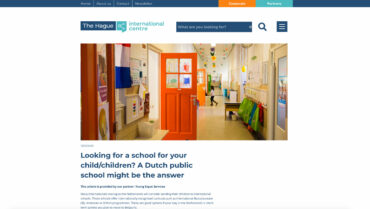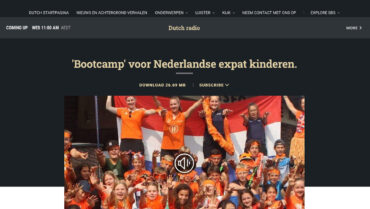Moving to another country can be challenging. Especially if you also have kids. Should your child go to an international school or a local Dutch school? What types of education can you choose from? If you have these questions and more about the Dutch school system, Young Expat Services can help you out! From helping you with the decision-making process and filling out application forms to accompanied school visits and school quality checks, their service will help you find the right school for your child.
Perhaps you have found a school already and you’re about to start your Dutch adventure – how exciting! Let Young Expat Services inform you about the main Dutch customs you need to know about!
Let’s celebrate!
Having your kids go to a Dutch school means you will have to deal with Dutch culture and you’ll probably want your child to integrate as quickly as possible. Of course, celebrations may vary from school to school, but here is a general idea of what to expect.
YES helps expats find the right school for their child in the Netherlands
Birthday (verjaardag)
For your child, this is probably the most important day of the year. At school, this special day will be celebrated as follows. Your child brings a treat (traktatie) for their classmates and for the teachers. It’s wise to discuss the most suitable day for the traktatie with the teacher in advance. Please note that most schools have a healthy treat policy.
Younger children generally receive a paper birthday hat made by the teacher. The birthday child picks two other children to walk through the school and give the other teachers a small treat. So, don’t forget to bring a treat for all the teachers as well.
Birthday parties (verjaardagspartijtje)
If you are organising a birthday party, please distribute the invitations in a discrete way, in order to avoid disappointment for the children who are not invited. Please note that you’re not obliged to invite the whole class. Many Dutch people invite as many children as the age of the birthday child, e.g. 5 years old means 5 invitees.
If your child is invited to a birthday party, you drop off your child and pick them up when the party is over. It’s not custom that you stay with your child during the party. Also, Dutch children unwrap their presents and give thanks at the party, so don’t expect a thank you note.
November 11 (Sint Maarten)
On November 11, in some parts of the Netherlands (including the Amsterdam area), children walk down the streets in small groups carrying handmade paper lanterns. They’ll ring the doorbell and sing a Sint Maarten song. After the song, you should give them some candy.
A popular song to sing is: “Sint Maarten, Sint Maarten, de koeien hebben staarten, de meisjes hebben rokjes aan, daar komt Sint Martinus aan”
YES is an expert on the Dutch school system, and offers a personal approach!
December 5 (Sinterklaas)
Sinterklaas activities start at least three weeks before December 5. The school and classrooms are decorated with Sinterklaas decorations. The children leave one of their shoes in the classroom overnight to receive a small gift in it. “Messy Piet”, one of Sinterklaas’ helpers, will usually visit the school, leaving a big mess in the classrooms. The children love this.
On December 5, Sinterklaas and his helpers (Pieten) arrive at school and the children will sing songs to welcome them. Parents are usually only invited to watch the arrival of Sinterklaas in the morning. The children usually receive a gift from Sinterklaas (this is organised by the school).
The older children (age 8 and up) celebrate in a different way. They randomly pick a name of a classmate written on a piece of paper (lootjes trekken), like Secret Santa. They will need to buy a small gift for this classmate. This gift has to be hidden in a handmade creation (often made with paper mache) called a “surprise” and is accompanied by a self-written poem (Sinterklaasgedicht) about that particular classmate.
Christmas (Kerst)
How your school celebrates Christmas depends on its religious background. Some schools go to church or put on a Christmas play. Many schools organise a Christmas dinner party (evening), where the children are dressed-up nicely and bring a meal to share. There will probably be a sign-up list at the school where you can write down what you’ll bring.
Easter (Pasen)
A lot of schools organise an Easter breakfast. Some schools make an Easter box. This box (can be a shoebox) will be decorated by your child and you fill this with a nice breakfast. This box is meant to be given to another child (secret Easter Bunny).
Avondvierdaagse
Many schools participate in the “Avondvierdaagse”. This is a walk taking place over four evenings. All children gather at a central place (e.g. the local sports ground) and start walking the route together with children from other schools. Every evening, the route differs, and you can choose to walk five or ten kilometres per day. The fourth evening (the last one) is special; family and friends will wait at the finish line to give the children gifts, flowers or sweets. They all receive a medal for participating.
Musical
At the end of the year, the children in group 8 will perform in a musical. In general, this is their last activity at school before they leave. It is performed several times (for the children at school and for their parents / grandparents).
Teachers’ day (lerarendag)
Some schools organise a teachers’ day. On this day, all the teachers’ birthdays are celebrated. Class parents will probably organise the presents, otherwise, your child may bring a small present.
Need help finding a suitable school for your child? Contact YES now!
Other Dutch school customs
Here are some other Dutch school customs you should know about:
Reporting sickness (ziek melden)
If your child is ill, you should inform the school as soon as possible. You don’t need a doctor’s note for school. Your child goes back to school when you decide they are fit again.
Lice (luizen)
Not exactly the most popular thing to talk about: lice. It’s very annoying when a child has lice, but it’s nothing to be ashamed of. In order to prevent an outbreak, so-called lice-parents regularly check all the children’s hair. If they find lice or nits, the parents are phoned to pick up their child. Their hair should be treated immediately to stop it from getting worse. After treatment, the child can come back to school.
Playdates (speelafspraakjes)
Playdates are very popular and a big thing for Dutch pupils. After school, the children play at each other’s homes without the parents of the visiting child. Playdates are organised by the parents and children, school is not involved in this. In general, the children should be picked up before dinner (around 6pm).
You should inform your teacher if your child is going to leave school with someone else. Without your advance permission, a child is not allowed to leave with anyone else.
PE (gym)
The youngest children do PE in their underwear and are barefooted. If you buy sports shoes for them, make sure the soles are white (so the soles won’t leave marks) and your child can get the shoes on / off by themselves (e.g. velcro shoes). The children bring their own sports clothes to school from the age of six. Please make sure that your child wears clothes that they can take off and put on by themselves on days when they have PE.
Lunch box
Please make sure that your child brings a snack or lunch which they can eat independently. At Dutch schools, there are no facilities to prepare food.
Contact Young Expat Services
Young Expat Services is specialised in supporting families with children coming to the Netherlands and helping them find the right school. If you have any questions about Dutch or international schools, please feel free to contact and consult them! They will be happy to help you.
In a one-hour call, they will provide you with information about Dutch schools, as well as international schools in the Netherlands. This is especially handy if you are not sure which type of school is the right one for your child.
Young Expat Services also offers summer expat camps for international children who want to practice their Dutch and play hockey during the summer.



